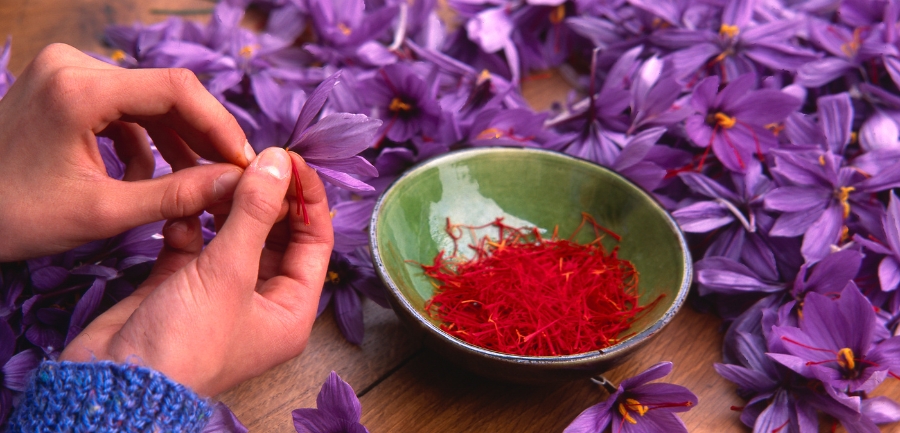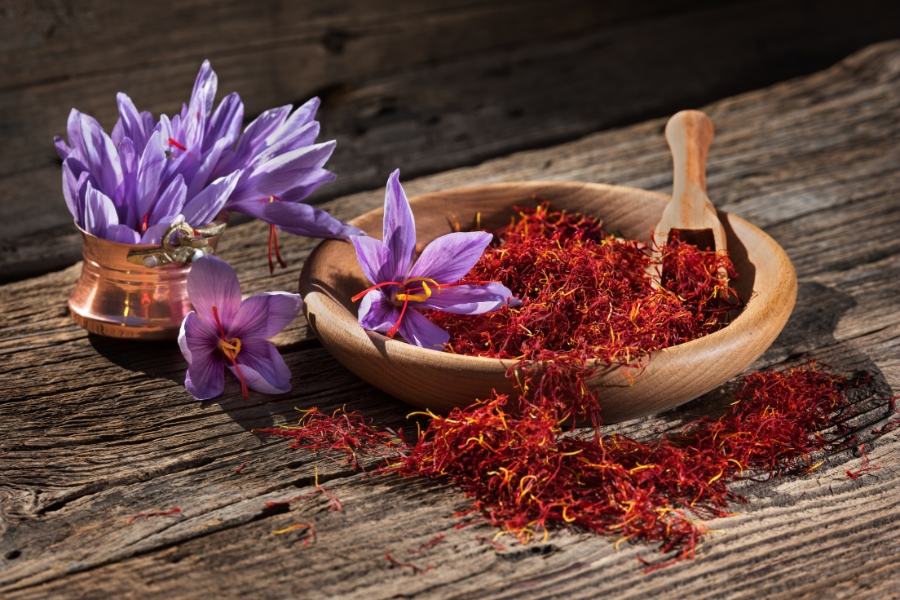Saffron, also known as “red gold,” is one of the most expensive and prized spices in the world. Obtained from the dried stigmas of the Crocus sativus flower, saffron is not just an exceptional culinary ingredient but also a treasure trove of health benefits.
In this blog post, we will explore the diverse uses of saffron and its impressive therapeutic properties.
What is Saffron and Why is it So Special?
Saffron stands out for its vibrant color, distinctive aroma, and slightly bitter, sweetish taste. Each strand of saffron is hand-picked, which explains its high price. But beyond its economic value, saffron is valued for its rich composition of bioactive compounds, such as crocin, safranal, and picrocrocin, which are responsible for its color, aroma, and taste, as well as its health benefits.
Uses of Saffron:
Saffron has a wide range of uses, both in the kitchen and for medicinal purposes:
- Culinary Spice: It is a key ingredient in many cuisines around the world, adding color, aroma, and a subtle flavor to dishes. It is used in paella, risotto, curries, desserts, and many other recipes.
- Natural Coloring Agent: Due to its intense color, saffron is used as a natural coloring agent in foods and beverages.
- In Traditional Medicine: Saffron has been used for centuries in traditional medicine for various ailments.
Remarkable Health Benefits of Saffron:
Scientific studies have highlighted the numerous health benefits of saffron:
- Mood Enhancement and Reduction of Depression Symptoms: Saffron is known for its antidepressant properties. Studies have shown that it can be as effective as some mild antidepressants in reducing symptoms of mild to moderate depression by influencing neurotransmitter levels in the brain.
- Alleviation of Premenstrual Syndrome (PMS) Symptoms: Saffron can help reduce the physical and emotional symptoms of PMS, such as irritability, anxiety, pain, and bloating.
- Improvement of Memory and Cognitive Function: Some studies suggest that saffron can improve memory and cognitive function, being particularly beneficial for older individuals.
- Powerful Antioxidant Properties: Saffron is rich in antioxidants that help protect cells from oxidative stress and damage caused by free radicals.
- Potential Anticancer Properties: Some preliminary research suggests that compounds in saffron may have anticancer properties by inhibiting the growth of cancer cells. More studies are needed to confirm these results.
- Improvement of Eye Health: Saffron may be beneficial for eye health, potentially slowing the progression of age-related macular degeneration (AMD).
- Blood Sugar Control: Some studies have shown that saffron may help regulate blood sugar levels, potentially being beneficial for people with diabetes.
- Appetite Suppression and Weight Loss Support: Saffron may help reduce appetite and promote a feeling of fullness, which can be useful in the weight loss process.
- Alleviation of Alzheimer’s Symptoms: Some research suggests that saffron may have a beneficial effect on the symptoms of Alzheimer’s disease.
How to Use Saffron:
- In the Kitchen: Use a few strands of saffron to infuse your dishes with color and aroma. You can dissolve the strands in a little warm water, milk, or broth before adding them to your food.
- Supplements: Saffron is also available in supplement form, capsules, or extracts. Follow the recommended dosages on the product label or consult a specialist.
- Saffron Tea: You can prepare a light tea by infusing a few saffron threads in hot water.
Precautions and Contraindications:
- High Doses: Consuming very high doses of saffron (over 5 grams) can be toxic and may cause serious side effects. Culinary doses are safe.
- Pregnancy: Pregnant women should avoid consuming large doses of saffron, as it may stimulate uterine contractions. Culinary doses are considered safe.
- Drug Interactions: Saffron may interact with certain medications, such as blood thinners. If you are taking medication, consult a doctor before using saffron supplements.
- Allergies: People with allergies to plants in the Iridaceae family (which includes saffron) should be cautious.
Important:
- Correct Identification: Ensure that the saffron you use comes from the Crocus sativus flower and not from other plant species that might be toxic.
- Quality: Use good quality dried saffron, preferably from reliable sources.

Saffron is much more than just an expensive spice. With a rich history of culinary and medicinal uses, it offers an impressive array of health benefits, from improving mood and cognitive function to providing antioxidant properties and potential anticancer effects.
Incorporating saffron into your diet, in moderate amounts, can be a delicious and effective way to improve your overall well-being.
Disclaimer: This blog post is for informational purposes only and does not replace professional medical advice. Always consult a doctor or specialist before using herbal remedies or supplements for therapeutic purposes.

